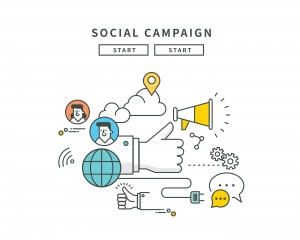
Facebook’s move to make the platform reach-driven relegates the engagement metric. Facebook suggests that we use products like its own Brand Effect Study as an alternative way to measure impact. The thing is: the study would take months to conduct, and would only provide us a broad understanding of what might have worked or otherwise in our communication.
So is engagement still relevant as a metric? Should we still optimize our content based on engagement data?
The engagement we know on Facebook may be passé, but engagement as an integral part of the communication framework is still at the heart of digital. Digital has evolved the relationship between the brand and consumer, from one-way to two-way.
From communicating through a platform that pushes the message, to a platform that gives consumers freedom to accept or reject the brand’s message or service. And this engagement has real impact on the brand, especially when the brand is intrinsic to the engagement. In fact, according to a study by OgilvyOne and Millward Brown, socially engaged customers are 42% more bonded to brands.
Facebook may want brands to focus on reach and frequency, but they have also redefined engagement internally. Facebook is now also measuring how long we look at posts, photos, and comments in our newsfeed. Software engineers Ansha Yu and Sami Tas wrote on the Facebook Newsroom blog: “Just because someone didn’t like, comment or share a story in their News Feed doesn’t mean it wasn’t meaningful to them.” The motivation to track time spent is all about learning from engagement behavior to vastly improve the News Feed experience.
Long story short, even Facebook still thinks engagement is important. Because engagement still matters. To truly understand the kind of content the audience craves, it is then critical for social media giants like Facebook, Twitter and Snapchat to provide better ways to measure engagement, beyond the traditional metrics of likes, comments, and shares.
Content platforms, digital CRM programs and e-Commerce platforms are examples of best use of engagement data to inform marketing strategies resulting in real impact on brand and business.
Digital opened the doors to engagement, and we need to keep them open.



